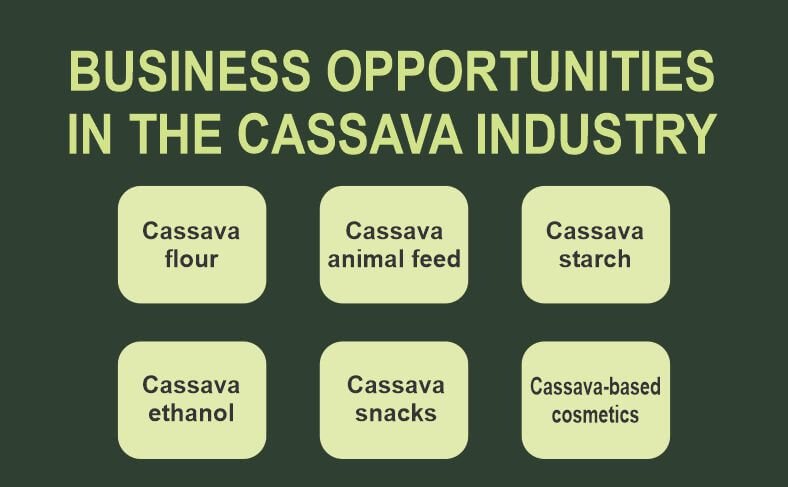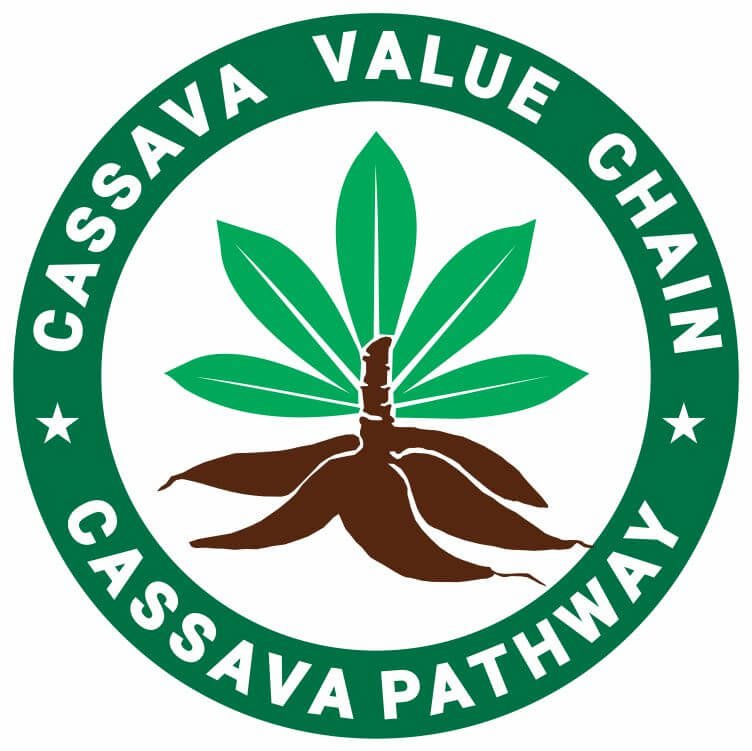Many cassava entrepreneurship opportunities exist as manioc is a staple food for many and a valuable industrial raw material.
Cassava entrepreneurship is rapidly becoming a gateway to wealth creation, food security, and industrial growth in many developing economies.
From farming and processing to manufacturing and trading, the cassava value chain offers extensive avenues for creating profitable and socially impactful businesses.
As global demand rises for cassava-based products, such as garri, high-quality cassava flour (HQCF), starch, ethanol, and animal feed, entrepreneurs are seizing the opportunity to build profitable businesses across the cassava value chain.
From farming and processing to packaging and export, cassava offers diverse entry points that cater to different skill levels, investment capacities, and market demands.
Whether you’re a new farmer, an agro-processor, or an investor, cassava entrepreneurship allows you to tap into a resilient, adaptable crop with high commercial value.
But success doesn’t happen by chance. It requires a clear vision, solid planning, market knowledge, and sustainable practices.
This introduction will walk you through the fundamentals of cassava entrepreneurship and show you how to turn this humble root into a thriving business opportunity.
Recommended: Cassava Business Plan Example
Key Takeaways
- Cassava entrepreneurs are vital in promoting sustainable agriculture and economic growth in communities.
- Using cassava as a raw material effectively can lead to diverse product offerings and increased business and market opportunities.
- Investing in research and development for cassava processing technologies can enhance product quality and value.
- Collaborating with stakeholders and government agencies can help cassava entrepreneurs overcome regulatory challenges and access funding for expansion and innovation.
What is Cassava Entrepreneurship?
Cassava entrepreneurship is the utilization of the cassava plant and its products, such as starch, flour, and chips, to create profitable businesses. You can grow cassava, process it into flour, starch, or animal feed, or supply industries that use it for biofuel and other products.
Success depends on smart farming, cost-effective processing, and finding the right markets.
Related: Cassava Packaging Solution
Understanding the Cassava Industry
Understanding the cassava industry involves grasping the cassava global market dynamics and trends, which are characterized by diverse applications, including food, animal feed, and industrial uses.
Key trends include the growth of processed products like cassava flour, starch, and chips, driven by demand for gluten-free and alternative-flour-based diets.
The market is also influenced by climate change, pests, and diseases, which impact yields and supply chain stability.
Additionally, market price fluctuations and post-harvest losses are significant challenges.
Understanding these dynamics helps cassava business enthusiasts identify opportunities and develop effective strategies for success in the cassava industry.
Business Opportunities in the Cassava Value Chain

Of course, there are many profitable business opportunities for an aspiring cassava entrepreneur along the cassava value chain if he can tackle the challenges therein.
Let’s take a closer look:
1. High-quality cassava flour (HQCF)
Business opportunities can come from unexpected places, and one such opportunity lies within the cassava value chain.
Cassava flour has been gaining popularity as a gluten-free alternative to wheat flour, and so one of the foremost profitable business opportunities in the cassava value chain.
This has led to a growing demand for cassava flour, presenting a lucrative business opportunity for entrepreneurs and investors looking to enter the market.
With the rise of gluten-free and paleo diets, as well as the increasing awareness of the health benefits of cassava flour, there is a growing market for this ingredient.
One of the key advantages of investing in the cassava flour business is that cassava is a highly productive and resilient crop.
So, if you are looking for a dynamic and lucrative business opportunity, consider exploring the cassava value chain and be a part of the cassava flour revolution.
More on cassava flour production business. Also, see our post on cassava flour processing.
2. Dried cassava for aquaculture feed
Dried cassava for aquaculture is the second in business opportunities in the cassava value chain
For example, Nigeria’s aquaculture industry, which has seen a tenfold increase in production over the last decade, demands high-quality feed.
Dried cassava is a sustainable, cost-effective, and nutritious feed source that can reduce reliance on imports and support the local economy.
However, challenges include palatability issues, high-cost protein supplements, and supply chain management.
Addressing these challenges through pelletization, effective protein supplement management, and efficient supply chain systems can ensure the success of this business.
Recommended: The Many Benefits of the Cassava Crop
3. Cassava starch for food and industrial applications
Cassava starch is a valuable product with many applications in both food and industrial sectors.
In the cassava value chain, the production of cassava starch is one such area that can be lucrative for entrepreneurs.
Cassava starch is a key ingredient in various food products, such as bread, snacks, and noodles, and is also used as a thickening agent in soups and sauces.
Also, it is used in industrial applications like paper, textile, and biofuel production.
The demand for cassava starch is increasing globally, driven by the growth of the food and beverage industry and the need for sustainable and renewable raw materials.
The cassava starch business offers numerous opportunities for entrepreneurs and investors, from farming and processing to manufacturing and trading.
Related: 5 Must-Have Equipment for Small-Scale Cassava Business
4. Ethanol production
Ethanol from cassava is a business opportunity in the cassava value chain.
Cassava waste, an agricultural byproduct, offers significant opportunities for ethanol production.
With the increasing demand for biofuels and sustainable energy sources, cassava-based ethanol production can be a lucrative business venture.
Nigeria, the world’s largest cassava producer, can capitalize on this opportunity by establishing ethanol production facilities.
Utilizing cassava waste reduces environmental impact and generates revenue. This business opportunity can create jobs and stimulate local economies. See a comprehensive guide on cassava ethanol production.
Recommended: How Long Before I Harvest My Cassava?
5. Clear beer production
The cassava value chain offers many business opportunities, and one such area is the production of clear beer from cassava.
Multinational beer companies are increasingly using locally sourced cassava to produce low-cost, clear beers that target untapped market segments.
This presents a business opportunity for entrepreneurs in cassava-producing regions.
Cassava-based clear beer production can leverage the abundant and cost-effective raw material, while also supporting local farmers and contributing to economic growth.
With the right processing techniques and market strategies, clear beer from cassava can become a thriving business in the cassava value chain.
Related: Introduction to Cassava Research
6. Cassava chips for animal feed
Cassava can be processed into a variety of products, including cassava chips for use in animal feed.
The demand for cassava chips as a feed ingredient is growing, particularly in regions like Europe and Asia, where it can substitute for more expensive grains like corn.
Producing cassava chips for animal feed can be a profitable business opportunity, especially for smallholder farmers and processors in cassava-producing regions.
Key factors for success include achieving competitive pricing compared to other feed ingredients, ensuring a reliable supply of quality cassava, and establishing relationships with feed compounders.
With the right approach, the cassava value chain can be leveraged to create value-added products like cassava chips that meet the needs of the livestock industry
Related: The Cassava Packaging Market and the Expected Growth
7. Sorbitol production
Derive sorbitol, a low-calorie sweetener, from cassava for use in toothpaste, pharmaceutical syrups, and food products.
Sorbitol production from cassava offers a lucrative business opportunity within the cassava value chain.
For instance, with Nigeria spending approximately N40 billion annually on sorbitol imports, local production can significantly reduce this expenditure.
The Raw Materials Research and Development Council (RMRDC) is actively promoting cassava-based sorbitol production, and recent research indicates that cassava can be a leading substitute for producing sorbitol.
This shift can create wealth, provide jobs, and improve food security while reducing the carbon footprint.
8. Cassava-based snacks
Cassava-based snacks offer a lucrative business opportunity within the cassava industry.
With rising demand for gluten-free and alternative flour-based products, cassava can be processed into a variety of snacks like cassava crisps, fries, and chips.
These products can be seasoned and packaged for retail, appealing to both local and export markets.
Investing in cassava snack production can create jobs, reduce reliance on imports, and contribute to food security while utilizing a versatile and underexploited crop.
9. Cassava-based industrial solvents
Cassava-based industrial solvents are a profitable business opportunity in the cassava value chain.
These solvents are derived from cassava waste and can be used in various industries such as pharmaceuticals, cosmetics, and food processing.
The global demand for sustainable solvents is increasing, and cassava-based alternatives offer a cost-effective and eco-friendly solution.
Investing in cassava-based solvents can tap into this growing market and create new revenue streams for cassava farmers and processors.
10. Cassava-based pharmaceuticals
Cassava-based pharmaceuticals can be a profitable investment opportunity in the cassava industry.
Cassava contains compounds like starch and glycosides that can be extracted and used in various pharmaceutical applications.
These include tablet binders, disintegrants, and drug delivery systems.
The global demand for natural, plant-based ingredients in pharmaceuticals is growing, heeding the call for sustainable and eco-friendly products.
11. Cassava-based cosmetics
Cassava contains antioxidants that can be extracted and used in various cosmetic applications in the booming cosmetic industry.
These include skin moisturizers, hair conditioners, and makeup products.
A smart investor in regions with abundant cassava can tap into this area and make a fortune.
Plant-based ingredients in cosmetics are growing, driven by the call for eco-friendly products.
12. Food supplements
The business opportunity in cassava food supplements is vast and promising.
With the growing trend towards healthier, organic foods, cassava offers a unique and nutritious ingredient for supplements.
Cassava is rich in vitamins, minerals, and fiber, making it a popular choice for those looking to improve their overall health and well-being.
By tapping into this growing market, entrepreneurs have the opportunity to create innovative and high-quality cassava-based products that cater to the increasing demand for natural and sustainable food options.
This business venture is not only lucrative but also contributes to a healthier and more sustainable future for consumers.
Related: Cassava Marketing Strategies
13. Cassava-based animal feed
Cassava has significant potential as an animal feed in cassava-producing regions, as it can reduce the high cost of feed, increase livestock production, and create job opportunities.
Cassava can partially substitute maize in animal feed, but its high moisture content, low protein, and cyanide content need to be addressed through processing techniques like slicing and drying.
Developing intermediaries to ensure a consistent supply of raw and processed cassava is key to enhancing the demand and supply of cassava-based feed.
14. Cassava-based paper products
Cassava is a valuable source of starch for paper production.
The clear, strong film properties of cassava starch make it an excellent raw material for paper manufacturing.
Cassava-based paper is strong enough for writing and printing purposes.
This presents a lucrative business opportunity for entrepreneurs to produce high-quality paper products from cassava starch.
The steady market demand for paper across various industries ensures the profitability of this cassava-based business venture.
15. Cassava-based textiles
Cassava is not just a food crop – it can also be used to produce textiles.
Entrepreneurs can venture into the production of cassava-based textiles, leveraging the plant’s natural fibers.
These eco-friendly fabrics can be used to create a range of products, from clothing to home furnishings.
By tapping into the growing demand for sustainable textiles, cassava-based textile businesses can capture a profitable investment opportunity.
16. Cassava-based biodegradable plastics
The business opportunity in cassava-based biodegradable plastics is vast and growing.
With the increasing demand for eco-friendly packaging solutions, cassava-based bioplastics offer a sustainable alternative to traditional plastics.
The market size is projected to reach USD 3.50 billion by 2032, driven by consumer demand and government regulations.
Entrepreneurs can capitalize on this trend by starting a manufacturing business of biodegradable plastic bags from corn and cassava granules, offering a profitable venture in the environmental sustainability industry.
17. Cassava-based biofuels
There is an opportunity for investors in cassava-based biofuel production.
Cassava can be converted into biofuels, offering a sustainable alternative to traditional fossil fuels.
With increasing demand for eco-friendly energy solutions, entrepreneurs can jump on this trend by establishing biofuel production facilities and leveraging the abundant cassava resources in Africa and other regions.
This venture not only benefits the environment but also empowers rural communities with a reliable energy source.
18. Cassava-based biogas production
Cassava-based biogas production is one of the profitable investments along the cassava value chain.
Cassava waste, including peels and stems, can generate biogas through anaerobic digestion.
This biogas can then be used for cooking, heating, or electricity generation.
Establishing small-scale biogas plants near cassava processing facilities allows entrepreneurs to turn waste into valuable energy, reducing environmental impact and generating additional revenue streams.
19. Cassava farming and production
The growing demand for cassava as a staple food crop, particularly in regions where it is a dietary staple, makes it a goldmine for farmers to take advantage of growing cassava commercially.
In my farming community in Nigeria, local farmers can have multiple cassava farms. These farms serve both subsistence and commercial.
My immediate family can harvest some farms and sell the raw cassava or process it into garri, giving it more commercial value when they sell in the local market.
This is economic empowerment and can even be a huge investment if more effort is put into cassava farming and processing on a large scale.
20. Cassava processing and value-added products
Processing cassava into value-added products such as cassava flour, starch, and chips can increase entrepreneurs’ profits.
21. Glucose Syrup Manufacturing from Cassava
You can produce glucose syrup from cassava by processing its starch through enzymatic hydrolysis.
The process begins by extracting starch from cassava roots, which are washed, peeled, and ground into a slurry.
Enzymes break down the starch into simpler sugars, converting it into a thick, sweet syrup.
This syrup is widely used in food and beverage industries as a sweetener, stabilizer, and moisture-retaining agent. It enhances the texture of confectionery, baked goods, and soft drinks.
Cassava-based glucose syrup is a cost-effective alternative to corn syrup, making it a valuable product in both local and international markets.
22. Cassava Bread Baking and Market Strategy
You can bake and sell packaged bread, buns, and pastries using a 20% cassava flour substitution, reducing reliance on wheat while maintaining quality and texture.
This approach makes products more affordable and supports local cassava farmers. Target urban business districts and high-traffic areas where demand for convenient, nutritious baked goods is high.
Effective branding, attractive packaging, and strategic pricing will help differentiate your products.
Partnering with supermarkets, bakeries, and online delivery platforms can expand reach.
Cassava-based baked goods appeal to health-conscious consumers, gluten-sensitive individuals, and those seeking locally sourced alternatives in a competitive bakery market.
23. Cassava Flour Milling and Market Strategy
Set up hammer or disc mills to produce high-quality cassava flour, a cost-effective alternative to wheat flour.
This flour is widely used by industrial food processors, bakeries, and biscuit manufacturers. Ensure strict quality control, proper drying, and fine milling to meet industry standards.
Target bulk buyers, including large-scale food companies, supermarkets, and wholesale distributors.
Establish strong supply chains with cassava farmers to maintain consistent production. Marketing strategies should highlight affordability, local sourcing, and gluten-free benefits.
Expanding into exports can also boost revenue, as global demand for cassava-based products continues to grow.
Developing a Cassava Business Plan
Developing a business plan is one of the steps every aspiring cassava entrepreneur has to take to have a strong footing in the cassava industry.
Let’s take a look at some of the things to consider:
1. Conducting market research and feasibility analysis
To become a cassava entrepreneur, you must study the demand for cassava products, understand the competition, and assess potential risks and opportunities in the cassava value chain.
2. Selecting the right cassava business model
Of course, there are many cassava business models, including farming and selling raw cassava, processing cassava into products like flour or chips, or developing value-added products.
Choosing the right model depends on factors like value chain dynamics, resources, and expertise.
3. Sourcing land, equipment, and other resources
This involves finding suitable land for farming or processing facilities, sourcing quality equipment, and securing other necessary resources like seeds and labor along the cassava value chain.
4. Securing financing and investment
Developing a detailed business plan will help in attracting financing and investment from banks, investors, or government programs.
This will be essential for purchasing land, equipment, and other initial start-up costs.
5. Obtaining necessary licenses and permits
To operate legally, business owners must obtain necessary licenses and permits from local authorities.
This may vary depending on the business model and location, so thorough research is necessary to ensure compliance with regulations.
Operational Considerations of Cassava Entrepreneurship
If you are aspiring for cassava entrepreneurship, considering how to operate is important for success.
You have to consider the following:
- Cultivating high-yielding cassava varieties: Source and plant high-yielding, disease-resistant, and climate-tolerant cassava varieties to maximize yields and reduce losses.
- Implementing efficient farming and post-harvest practices: Get familiar with efficient cassava farming practices such as proper land preparation, irrigation, storage and pest management to reduce losses through spoilage.
- Establishing reliable supply chains and logistics: Develop a reliable supply chain by partnering with local farmers, processors, and distributors to ensure a steady supply of high-quality cassava.
- Ensuring product quality and food safety standards: Implement quality control measures to ensure products meet international food safety standards. This includes proper processing, packaging, and labeling.
- Adopting appropriate processing technologies: Utilize modern processing technologies to enhance product quality, increase efficiency, and reduce costs. This includes investments in equipment and training for employees.
How Cassava Entrepreneurs Can Access Support and Partnerships in the Cassava Industry

As a cassava entrepreneur, it’s important to build a strong support network.
You should exploit government programs and see what they can offer, like valuable financial backing through funding and tax incentives.
You should also explore partnering with research institutions and industry groups that can expand your knowledge and open doors to new markets.
Securing contracts with major buyers provides stability while navigating regulations and improving product quality with expert guidance.
These collaborative efforts are key to driving your cassava business forward and achieving long-term success.
Recommended: Cassava in the US Market
Scaling and Expanding the Cassava Business
There are ways a cassava entrepreneur can expand their cassava business to maximize success:
Diversifying Product Lines and Market Segments
Successful cassava entrepreneurs diversify their product offerings to cover a wider range of customers and applications along the cassava value chain.
This can include developing value-added products like cassava flour, starch, chips, and even gluten-free foods to meet growing consumer demand.
Expanding into new market segments, such as animal feed and industrial uses, can also help diversify revenue streams and reduce reliance on a single market.
Exploring Export Opportunities
The global trade in cassava and its derivatives presents significant export opportunities for entrepreneurs.
Developing the ability to meet international quality and safety standards, as well as establishing reliable logistics and distribution channels, can open up access to lucrative export markets, particularly in regions like Europe and Asia.
Investing in Technology and Process Improvements
Cassava entrepreneurs should adopt advanced technologies and optimized methods of processing that can improve efficiency, quality of products, and profitability.
Investments in areas like precision farming, automated processing equipment, and waste reduction can help cassava businesses stay competitive and responsive to market demands.
Building Brand Recognition and Customer Loyalty
The social aspect of the business should not be left unexploited.
Establishing a strong, recognizable brand is important to survive in the cassava industry.
Cassava entrepreneurs should focus on developing a unique brand identity, engaging in targeted marketing, and providing excellent customer service to build a loyal customer base.
Navigating Regulatory Changes and Market Dynamics
Cassava entrepreneurs must stay informed about evolving regulations, industry trends, and market conditions to make informed decisions and adapt their strategies accordingly.
Collaborating with industry associations, regulatory bodies, and market intelligence providers can help navigate these dynamic environments.
FAQs About Cassava Entrepreneurship and Business Opportunities
How to start a cassava business?
Determine your target product, assess the market, set up a processing facility, obtain necessary licenses, and secure reliable raw material sources.
Is cassava business profitable?
Cassava is a highly versatile and in-demand commodity, making cassava processing and trading a potentially lucrative business opportunity.
What is the economic importance of cassava?
Cassava is a key industrial raw material used in paper, textile, and biofuel production, driving economic growth and development.
How can entrepreneurs access government support for cassava entrepreneurship?
Entrepreneurs can access government support through funding schemes, tax benefits, and regulatory assistance, which can help drive business growth and success.
What are the benefits of partnering with research institutions for cassava entrepreneurship?
Partnerships with research institutions improve knowledge and skills, improve product quality, and provide access to cutting-edge technology, ultimately driving business competitiveness.
How can entrepreneurs secure contracts with large-scale buyers for cassava products?
Entrepreneurs can secure contracts by building strong relationships with buyers, ensuring product quality, and meeting regulatory requirements, ultimately ensuring a steady market for their products.
What business opportunities are available in the cassava industry?
Various opportunities include cassava processing, production of cassava-based products, and exporting cassava to international markets.
How can I start a business in the cassava industry?
Start by conducting market research, developing a business plan, securing funding, and building relationships with cassava suppliers and buyers.
Is the cassava industry profitable?
Yes, the cassava industry can be profitable with the right planning and execution. Developing value-added products and accessing export markets can increase profitability.
What are the key challenges in the cassava industry?
Challenges include low yield due to pest and disease outbreaks, lack of mechanization, limited access to technology, and fluctuations in market prices.
Final Word from Cassava Pathway
Cassava entrepreneurship offers extensive opportunities for entrepreneurs to capitalize on the versatile and widely traded commodity.
By leveraging government support, industry partnerships, and market access, entrepreneurs can establish successful businesses that drive economic growth and development.
With the right strategies and resources, cassava entrepreneurs can navigate the global market and achieve long-term success.
References:
https://www.cassavaprocessing.com/Blog/how_to_start_cassava_processing_business_79.html
https://finmodelslab.com/blogs/write-business-plan/how-to-write-business-plan-for-cassava-farming
https://www.youtube.com/watch?v=N0ToV8DcgLY
https://www.agribusinesscoach.com/2016/12/Profitable-Commercial-Cassava-Farming-in-Nigeria.html
https://veggiegrow.ng/cassava-farming-in-nigeria/

Chimeremeze Emeh is a writer and researcher passionate about Africa’s most transformative root crop—cassava. Through his work at cassavavaluechain.com, he explores the entire cassava industry, from cultivation and processing to its diverse applications in food, health, and industrial use.
He also writes for palmoilpalm.com, where he shares his extensive experience and deep-rooted knowledge of palm oil, covering red palm oil, palm kernel oil, and refined products. His work there reflects his lifelong connection to agriculture and his commitment to promoting sustainable value chains in Africa.
Driven by curiosity and purpose, Chimeremeze aims to shed light on how cassava continues to empower communities, strengthen food systems, and link traditional farming wisdom with modern innovation.

